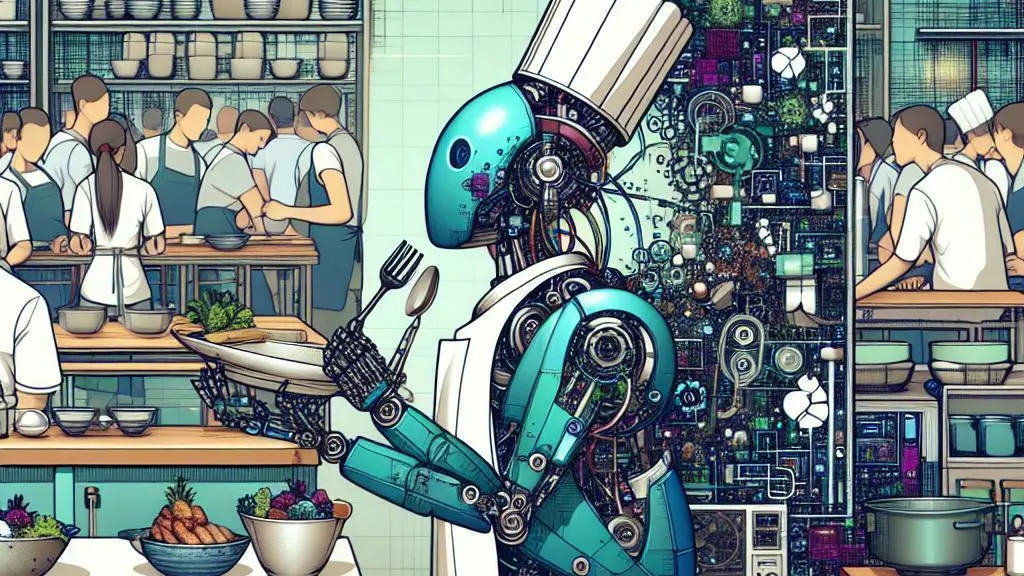The Rise of AI in Content Marketing: Risks, Benefits and Best Practices
The rapid emergence of artificial intelligence (AI) tools like ChatGPT is transforming content …

The hospitality industry, known for its dynamic and customer-centric approach, is on the cusp of a transformative era, thanks to the integration of Artificial Intelligence.
As a seasoned professional in the industry, having started as a chef after leaving school at 15, I've recently become fascinated by the potential of AI in revolutionising hospitality services. Drawing on insights from my experience and recent explorations, this article aims to delve into how AI can be seamlessly integrated into various aspects of hospitality, offering a competitive edge to businesses.
AI is not a distant future concept but a present reality, increasingly embedded in our current systems. Its application in hospitality is vast, from enhancing customer service to revolutionising back-end operations. The idea is about adopting AI and leveraging it to gain an edge over competitors.
Imagine a scenario where AI acts as the first point of contact, connected to all your social media, emails, and voice inquiries. A customer requested a booking for seven people on Friday night at 7 o'clock. The AI system checks your booking system and confirms availability, managing the entire process seamlessly. Moreover, AI can personalise the experience from the first interaction, asking if the occasion is unique and tailoring the service accordingly. This approach improves customer experience and empowers service staff with detailed information to exceed guest expectations.

Moving beyond restaurants, implementing innovative hotel technology is surprisingly affordable and significantly enhances guest experiences. Imagine walking into a hotel room where you can use voice commands to command the lights, air conditioning, and other amenities. This level of convenience is not just a luxury but a new standard in customer service.
In kitchen management, AI can revolutionise stock management and menu planning. By integrating AI with your inventory and menu database, it can track daily sales and adjust stock levels accordingly. As AI technology advances, it could even suggest special menu items based on the stock sitting for a while, optimising inventory usage and menu variety.
The primary benefit of AI in hospitality is creating a personalised and patient customer experience. Operational efficiency is significantly boosted, with AI taking over mundane tasks, allowing staff to focus on more critical aspects of service—data-driven insights help make informed business decisions without the need for extensive data management systems. Most importantly, AI support can reduce staff stress, improving retention and overall customer satisfaction.
Despite the numerous advantages, integrating AI into hospitality has its challenges. Privacy and data security are significant concerns, mainly concerning personal customer information. Over-reliance on technology can create vulnerabilities, and the initial cost of implementing AI systems can be substantial. There's also the risk of customer and staff scepticism, with some preferring human interaction over AI and others fearing job replacement.

The return on investment (ROI) from AI integration is multifold. While there's a significant upfront cost, the long-term benefits include lower labour costs, increased operational efficiency, and enhanced customer experience, leading to higher revenue. Furthermore, AI-driven operations provide a competitive advantage in a market increasingly leaning towards technology-driven solutions.
As we stand at the precipice of a technological revolution in the hospitality industry, the integration of AI presents both immense opportunities and significant challenges. For business professionals in management and upper management roles, understanding the potential of AI in transforming customer experiences, operational efficiency, and overall business strategy is crucial.
The key lies in balancing leveraging AI's capabilities and maintaining the irreplaceable human touch in hospitality services. The future of hospitality lies in embracing AI, not as a replacement for human interaction but as a tool to enhance and complement it, driving the industry towards unprecedented levels of service and efficiency.
Some other posts you may like

The Rise of AI in Content Marketing: Risks, Benefits and Best Practices
The rapid emergence of artificial intelligence (AI) tools like ChatGPT is transforming content …
December 13, 2023
Read More
A review of Reiki by Web3Go
Exploring Reiki by Web3Go felt like setting sail into the vast and often turbulent seas …
December 13, 2023
Read More